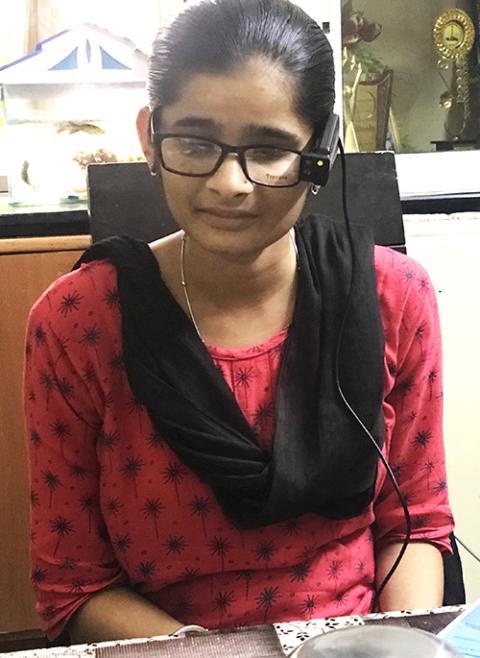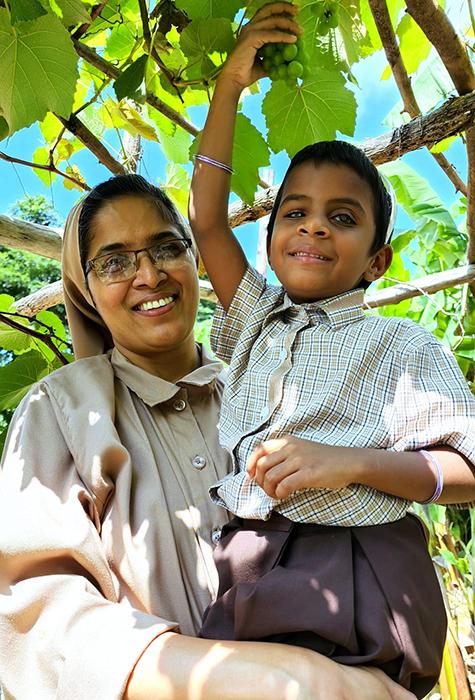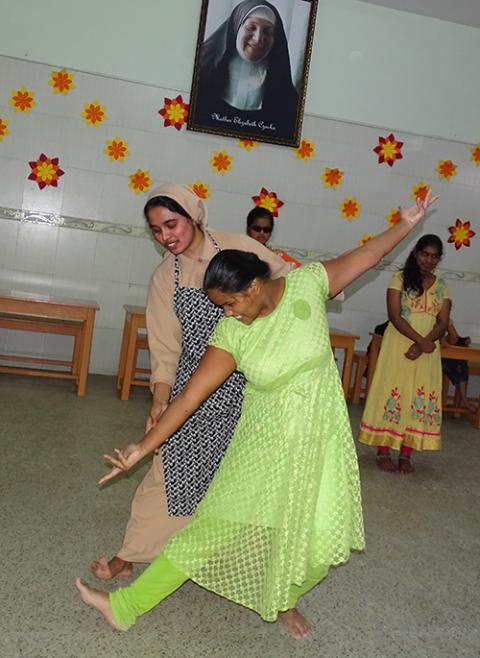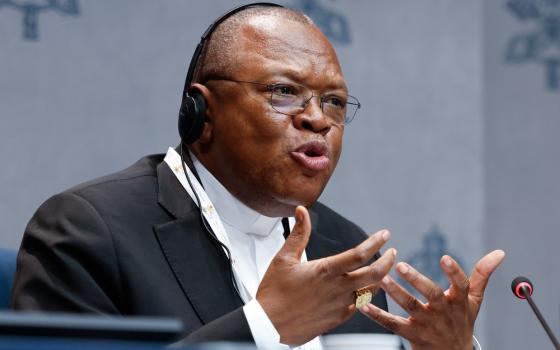
Franciscan Sisters Servants of the Cross Sr. Mary Teresita (left) and Sr. Mary Clare (right), pioneers of Jyothi Seva, are pictured with students in Bengaluru, southern India. (Thomas Scaria)
Shilpa Chandrappa is blind from birth but dreams of becoming an officer in the Indian Administrative Services.
Helping the 21-year-old woman achieve her dreams are the Franciscan Sisters Servants of the Cross, who manage Jyothi Seva ("service of light"), a school for the visually impaired in Bengaluru, the capital of the southern Indian state of Karnataka.
The Polish congregation that exclusively works with the visually impaired opened the Bengaluru school in 1991.
Shilpa, who prefers to be called by her first name, is among some 100 visually impaired students in the school, most of them residing in the convent with 17 nuns.

Shilpa Chandrappa, a genetically blind resident of the Jyothi Seva Convent Hostel in Bengaluru (Thomas Scaria)
"I have never regretted being blind in life. I am happy that this has brought me to these loving sisters," Shilpa told Global Sisters Report, holding the hands of Sr. Mary Clare, one of the two nuns who started the school.
"I have experienced the best loving care, acceptance and dignity here," Shilpa said, who is completing a three-year bachelor's course at Jesuit-managed St. Joseph's University in Bengaluru.
Started in a small house, Jyothi Seva now houses children from the age of 3 upwards. The school was modernized in 2003 with a new building.
Thamasoma jyothirgamaya ("from darkness to light"), drawn from Indian spirituality, is the slogan of the only school for the visually impaired managed by Catholic nuns in Bengaluru city. In 2016, the Karnataka government awarded Jyothi Seva as the "best school for the blind."
Sr. Mary Teresita, the superior of the Jyoti Seva Convent, says the school's goal is to lead blind children to a bright future. "We do it as professionally as possible," she told GSR.
The 51-year-old founding member of Jyothi Seva recalled that the school was her congregation's first project in India. It now has four similar schools in other parts of India.

Franciscan Sisters Servants of the Cross Sr. Mary Teresita teaches blind students at Jyothi Seva School in Bengaluru, southern India. (Courtesy of Sr. Mary Clare)
"Our inspiration is our founder, Mother Elizabeth Rósa Czacka of Poland, who became blind at 22 and started the congregation to serve the blind," Teresita added.
Czacka, who was born in an aristocratic family, lost her eyesight as a young woman during a horse riding accident. She underwent several operations and treatment but could not regain her eyesight.
She founded an institute for the blind in 1911, and seven years later, a religious congregation with the name Franciscan Sisters Servants of the Cross. She died in 1961, at age 84. She was beatified Sept 12, 2021.
"She realized that even without sight, one can be fully human and productive in life," Teresita said. "Not only me, but all our sisters have a lifelong commitment to the blind and that is the only ministry we do in the world."
The congregation has convents and schools for the visually impaired in Poland, Ukraine, Africa and India. In India, it has 30 members serving four centers, and 17 are in Jyothi Seva.

Franciscan Sisters Servants of the Cross Sr. Mary Cecilia gives biology science sessions to students with the help of a sculpture in Bengaluru, southern India. (Courtesy of Sr. Mary Clare)
Teresita said Jyothi Seva is a registered society with the Indian government. It aims at helping the visually impaired to discover their dignity and value and to bring out the best in themselves.
"The school is like a big family where children recognize each sister by their voice or even by their steps," Teresita said, adding, "They play with us, talk, laugh, help each other and lead a happy life even when they cannot see."
The school teaches from preschool to seventh grade. Then they go to another convent school managed by Satya Seva Catechist Sisters. After higher secondary education, they, like Shilpa, attend Catholic colleges in the city.

Franciscan Sisters Servants of the Cross Sr. Mary Clare with Sahana, a resident of Jyothi Seva, during an educational trip to a vineyard in Bengaluru, southern India (Courtesy of Sr. Mary Clare)
Johan Jernes and Gracy Jessy held the hands of Sr. Mary Clare, who continues serving the center, as they went to the refectory for tea and snacks. Others followed them.
Johan, a third grader, and Gracy, his younger sister, live on the campus, as their parents are also visually impaired.
Children do not use walking sticks on campus but are guided by a team leader, often a nun. They are divided into smaller groups based on their age.
Clare said her happiest moments are when she spends time with the children in the center.
"They are innocent, lovely and not affected by the dark realities of the world," the nun said, who was recognized by the government for "excellence in service to the blind" on this year's International Day of Persons with Disabilities.
The World Health Organization reported in 2010 that more than 8 million blind people lived in India. The Times of India reported in 2022 that cases of blindness and visual impairment had decreased in 2019 versus 2010.
Research has linked increasing air pollution to "an increased risk of irreversible sight loss," according to CNN. The World Health Organization states that the leading causes of blindness and vision impairment globally are cataracts and refractive errors, among others.
Clare said blindness could be prevented if diagnosed early and appropriate treatment is taken on time. She observed that several cases of blindness in villages are not diagnosed or treated.
Jyothi Seva now collaborates with Project Vision, a Claretian project for awareness building and early detection of cases in communities.

Franciscan Sisters Servants of the Cross Sr. Mary Juliana teaches mathematics to Theerthavathi, a student of the Jyothi Seva School, Bengaluru, southern India. (Courtesy of Sr. Mary Clare)
Clare said the students in her school are all genetically blind, whose blindness cannot be rectified. "Our role is to make them live with their blindness and yet be productive to lead a quality life," she explained.
"So far, we could transplant cornea successfully for only one of our boys," the 51-year-old nun added.
She also said many children face discrimination in their homes and, sometimes, mental torture. "Some do not want to go home during holidays and are just happy here."
The nuns visit the homes of such children to guide their parents.
"Some children are orphans or rejected by their parents whom we take care of," Clare said.
Advertisement
Several children from Jyothi Seva have earned their bachelor's degrees.
One of them, Michael John, works as a bank manager in Chennai, some 220 miles east of Bengaluru.
"I could come to this position only because the sisters admitted me to the best colleges after Jyothi Seva," the 33-year-old told GSR. He has completed his studies but still stays in Jyothi Seva.
He said children of Jyothi Seva get jobs because the nuns provide them with quality education.
Satya (single name), a former student, teaches music in Jyothi Seva while working in an information technology firm in the city. "I would not have grown to this level if I was not part of the Jyothi Seva family," the 25-year-old woman said.

Johan Jernes (standing, far left) and Gracy Jessy (standing second from left), blind siblings from blind parents, are pictured with Satya, a music teacher (sitting), and Vinita Veerappan, IT employee (sitting far right) at Jyothi Seva Convent Hostel, managed by Franciscan Sisters Servants of the Cross in Bengaluru, southern India. (Thomas Scaria)
Vinita Veerappan, an orphan residing in Jyothi Seva, also works for a computer company. She works from home, while several others in government and corporate sectors live outside the school compound as paying guests.
Sr. Mary Angela, in charge of the younger children in Jyothi Seva, said that she feels like a mother as she takes care of them, plays with them and prepares them for school.
"I really enjoy this work, and I am grateful to God for this vocation," the nun from the northeastern Indian state of Mizoram said as she took her children to work in the garden.
Sr. Anita Mary, the school principal, said she has an educated and qualified team of sisters and laypeople, including four visually impaired people, among her staff.
"Even though we have classes only up to the seventh grade, we conduct special classes for the older ones as they have to compete with the [other] students in colleges," Mary said.

Franciscan Sisters Servants of the Cross Sr. Mary Rachel (behind) teaches dance to Najiran, a student of Jyothi Seva School for the Blind in the southern Indian city of Bengaluru. (Courtesy of Sr. Mary Clare)
She added that the state government pays the salaries of the teachers. However, the center has limitations as it functions inside a small compound.
"One playground and a new hostel building are our immediate requirements, and we hope someone will support us," she said. The school does not charge fees for tuition or accommodation.
The congregation also runs the House of Joy, a vocational training center for the blind at Kotagiri in the neighboring state of Tamil Nadu, a community center on the outskirts of Bengaluru, and a school for the blind in Jowai, Meghalaya state in northeastern India.
Claretian Fr. George Kannanthanam commended the Jyothi Seva sisters for the education and skills-building of the children. "They provide overall development of the children so they can stand on their own," he told GSR.
He said the Sumanahalli Center for the Disabled and Project Vision support the nuns with food and medicine for 20 older students in the Jyothi Seva school as part of a Hilton Foundation fund for people with disabilities.
On Dec. 4, when GSR visited the center, Shilpa looked thrilled to receive a "smart vision glass" the previous day, gifted by Project Vision, on the of Persons with Disabilities.
"I currently practice using this smart glass to read textbooks, use computers, recognize persons and get guidance for movements," she said.
Clare, who helped Shilpa to use the smart glass, said the device identifies the text in books and reads it to the user or identifies the object before the person and communicates its nature. She added that the smart glass acts as a digital assistant to the user to manage various activities.
Shilpa goes to her college, nine miles away, by public bus.
"Now I am confident that I can manage myself," Shilpa said, who plans to take the entrance test for the Indian Administrative Services.






